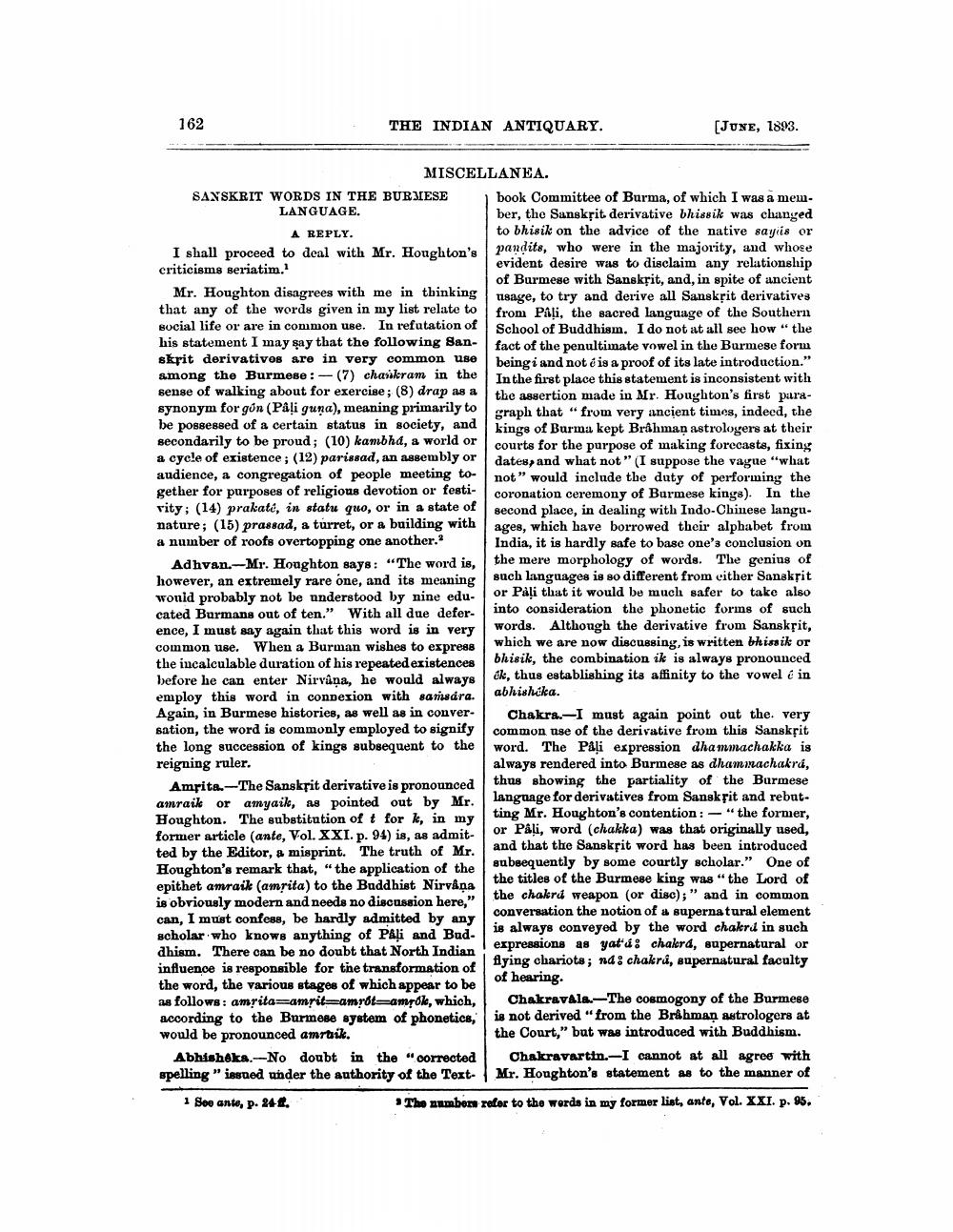________________
162
THE INDIAN ANTIQUARY.
[JUNE, 1893.
MISCELLANEA. SANSKRIT WORDS IN THE BURMESE book Committee of Burma, of which I was a memLANGUAGE.
ber, the Sanskrit derivative bhissik was changed A REPLY.
to bhisik on the advice of the native sayiis or I shall proceed to deal with Mr. Houghton's
pandits, who were in the majority, and whose
evident desire was to disclaim any relationship criticisms seriatim.
of Burmese with Sanskrit, and, in spite of ancient Mr. Houghton disagrees with me in thinking usace. to try and derive all Sanskrit derivatives that any of the words given in my list relate to from Pali, the sacred language of the Southern social life or are in common use. In refutation of School of Buddhism. I do not at all see how "the his statement I may say that the following San- fact of the penultimate vowel in the Burmese form skrit derivatives are in very common use
beingi and not d is a proof of its late introduction." among the Burmese :-(7) chaikram in the
In the first place this statement is inconsistent with sense of walking about for exercise; (8) drap as a
the assertion made in Mr. Houghton's first parasynonym for gún (Pali guna), meaning primarily to
graph that "from very ancient times, indeed, the be possessed of a certain status in society, and kings of Burma kept Brahman astrologers at their secondarily to be proud; (10) kambhd, a world or
courts for the purpose of making forecasts, fixing a cycle of existence; (12) parissad, an assembly or
dates, and what not" (I suppose the vague "what audience, a congregation of people meeting to- not" would include the duty of performing the gether for purposes of religious devotion or festi
coronation ceremony of Burmese kings). In the vity: (14) prakati, in statu quo, or in a state of second place, in dealing with Indo-Chinese langu. nature; (15) prassad, a turret, or a building with
ages, which have borrowed their alphabet from a number of roofs overtopping one another." India, it is hardly safe to base one's conclusion on Adhvan.-Mr. Houghton says: "The word is,
the mere morphology of words. The genius of however, an extremely rare one, and its meaning
such languages is so different from either Sanskrit would probably not be understood by nine edu
or Pali that it would be much safer to take also cated Burmans out of ten." With all due defer
into consideration the phonetic forms of such ence, I must say again that this word is in very
words. Although the derivative from Sansksit, common use. When a Burman wishes to express
which we are now discussing, is written bhiss ik or the incalculable duration of his repeated existences
bhisik, the combination ik is always pronounced before he can enter Nirvana, he would always
Ok, thus establishing its affinity to the vowel é in employ this word in connexion with satisdra.
abhishika. Again, in Burmese histories, as well as in conver- Chakra-I must again point out the very sation, the word is commonly employed to signify common use of the derivative from this Sansksit the long succession of kings subsequent to the word. The Pați expression dhammachakka is reigning ruler.
always rendered into Burmese as dhamuachakra, Amrita.-The Sansksit derivative is pronounced thus showing the partiality of the Burmese amrail or amyaik, 18 pointed out by Mr.
language for derivatives from Sanskrit and rebut. Houghton. The substitution of t for k, in my
ting Mr. Houghton's contention : - "the former, former article (ante, Vol. XXI. p. 94) is, as admit
or PAļi, word (chakka) was that originally used, ted by the Editor, a misprint. The truth of Mr.
and that the Sanskrit word has been introduced
subsequently by some courtly scholar." One of Houghton's remark that, "the application of the
the titles of the Burmese king was "the Lord of epithet amraik (amrita) to the Buddhist Nirvana is obviously modern and needs no discussion here,"
the chakrd weapon (or disc);" and in common can, I must confess, be hardly admitted by any
conversation the notion of a supernatural element scholar who knows anything of Påļi and Bud
is always conveyed by the word chakri in such
expressions as yatiá: chakrd, supernatural or dhism. There can be no doubt that North Indian influence is responsible for tne transformation of
flying chariots; nd: chakrá, supernatural faculty the word, the various stages of which appear to be
of hearing. as follows: amrita=amritzamrótampók, which, Chakravala.-The cosmogony of the Burmese according to the Burmese system of phonetice,
is not derived from the Brahman astrologers at would be pronounced amrtik.
the Court," bat was introduced with Buddhism. Abhisheka.-No doubt in the "corrected Chakravartin.-I cannot at all agree with spelling" issued under the authority of the Text- Mr. Houghton's statement as to the manner of 1 See ante, p. 244.
The numbon refer to the words in my former list, ante, Vol. XXI. p. 85.




